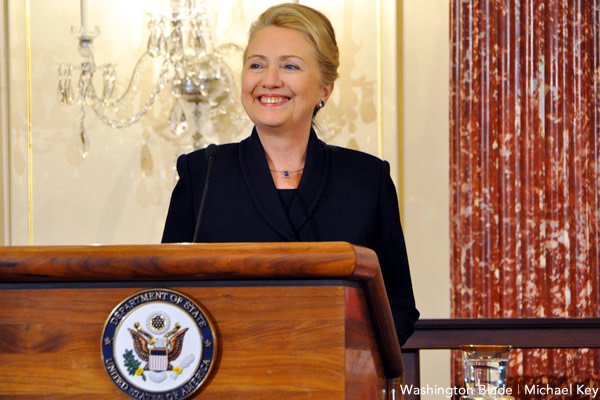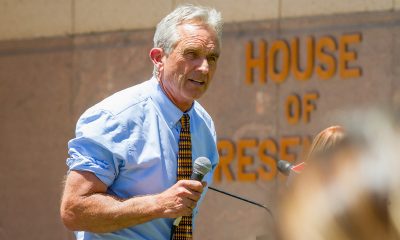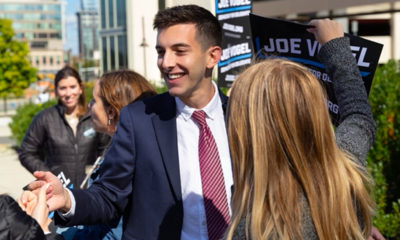National
Clinton: LGBT-inclusion ‘the smart thing’ for U.S. foreign policy
Secretary speaks before LGBT Foreign Service officers

Secretary of State Hillary Clinton delivered on Wednesday what might be her last public address before an LGBT audience as chief diplomat for the United States when she told group of LGBT Foreign Service officers their service is integral to the country.
“Creating an LGBT-welcoming workplace is not just the right thing to do, it’s also the smart thing,” Clinton said. “And part of that is because the nature of diplomacy has changed and we should and need to keep up. Today, we expect our diplomats to build relationships not just with their counterparts in foreign governments, but from people from every continent and every walk of life, and, in order to do that, we need a diplomatic core that is as diverse as the world we work in.”
Additionally, Clinton said having an LGBT-inclusive State Department makes the Foreign Service corps “better advocates” for American values.
“When anyone is persecuted anywhere and that includes when LGBT people are persecuted, we’re kept from fully participating in their societies,” Clinton said. “They suffer, but so do we. We are diminished because our commitment to the human rights of all people has to be a continuing obligation and mission of everyone who serves in the government of the United States.”
Clinton delivered the remarks in Benjamin Franklin room at the State Department to observe the 20th anniversary of the department’s LGBT affinity group, Gays & Lesbians in Foreign Affairs Agencies, or GLIFAA.
She reminded the estimated 200 people in attendance that world in which GLIFAA was created was much different than today and the organization has worked over the course of 20 years to create a fairer workplace for LGBT Foreign Service officers.
“As we heard, in 1992, you could be fired for being gay,” Clinton said. “Just think about all of the exceptional public servant — the brilliant strategists, the linguists, the experts — fired for no reason other than their sexual orientation. Think of what we lost because we were unable of their hard work, expertise and experience.”
Clinton also gave recognition to Tom Gallagher, whom she said joined the State Department in 1965 and in the early 1970’s became the first openly gay Foreign Service officer. He was in the audience during Clinton’s speech and rose when the secretary mentioned him.
“He served in the face of criticism and threats, but that did not stop him from serving,” Clinton said. “I want to take this moment just to recognize him, but also to put into context what this journey has meant for people for people of Tom and my generation because I don’t want any of you who are younger ever to take for granted what it took for people like Tom Gallagher to pave the way for all of you. It is not a moment for us to be nostaglic; it is a way for us to remember.”
The speech occurs almost one year after Clinton gave a high-profile speech in Geneva in favor of LGBT human rights, telling LGBT people that face human rights abuses overseas they “have an ally in the United States of America.” Clinton noted her speech from the previous year during her remarks at the State Department.
“When I gave that speech in Geneva and said we were going to make this a priority for American foreign policy, I didn’t see it as something special, something that was added on to everything else we do, but something that was integral to who we are and what we stand for,” Clinton said.
Toby Quaranta, who’s gay and president of the D.C Young Democrats, was among those in attendance and said the speech was “an example of why she is such a popular secretary of state.”
“She wants to make advances for LGBT people not just as a way to advance the cause of human rights, but also as a way to advance American interests abroad,” Quaranta said. “It’s a moral issue with a pragmatic end. That’s her way of doing business, and that is why she has been so successful as secretary of state.”
No new announcements were made during the State Department address, but the event was geared toward thanking those present as opposed to addressing policy issues.
Clinton gave no update during the speech on where she stands on marriage equality. She remains one of the few high-profile Democrats who’s yet to publicly endorse same-sex marriage and has remained silent in the issue even after her employer President Obama came out for marriage equality in May.
Also absent from Clinton’s speech was any mention of anti-gay legislation in Uganda that’s received considerable international attention out of fears the bill may soon be headed toward passage. It would institute a sentence of life in prison for homosexuality acts and possibly the death penalty.
But Clinton did tout the LGBT achievements the State Department has made under her watch. Among them are extending benefits to the same-sex partners of Foreign Service officers. On transgender issues, the department instituted policy against workplace discrimination for transgender employees and eased the process to allow transgender Americans to change the gender marker on their passports.
“Together we have worked to make something very simple and right come true: Our people should not have to choose between serving the country they love and sharing a life with the people with they love,” Clinton said.
Cheryl Mills, Clinton’s chief of staff and a long-time adviser who worked on her 2008 presidential campaign, also commended those present as she said her boss seeks to ensure each person across the globe can “live up to his or her God-given potential.”
“That principle is a very simple one, but its implementation too often requires courage and persistence, relentlessness and willingness to actual do something when doing nothing is absolutely the easiest course of action,” Mills said. “Those who have been part of and stayed with GLIFAA, they have always managed to do something, and the work that you all have done together has brought the change that we have seen in the department.”
Clinton has indicated that she intends to step down as secretary of state after the conclusion of Obama’s first term. Speculation persists that she may pursue that Democratic nomination for the presidency when Obama completes his second and final term in 2016, although she hasn’t stated she’d run.
Lane Hudson, a gay Democratic activist and outspoken Clinton supporter, said he expects her to maintain a strong relationship with the LGBT community whatever her course of action she pursues after she leaves the State Department.
“Given her long history with the LGBT community and her exemplary record on issues of equality at the State Department, I fully expect there to be a meaningful ongoing relationship between her and the community, whether she pursues the presidency or continues to advocate for equality for all as a private citizen,” Hudson said.
Others who spoke before the audience were GLIFAA President Ken Kero-Mentz, USAID Deputy Administrator Donald Steinberg, and Daniel Baer, who’s gay and deputy assistant secretary of state for the Bureau of Democracy, Human Rights & Labor.
Notable members of the LGBT community who were in the audience included U.S. ambassador to New Zealand David Huebner, former U.S. ambassador to Romania Michael Guest, Human Rights Campaign President Chad Griffin, White House LGBT liaison Gautam Raghavan and Amanda Simpson, who was first openly transgender woman political appointee in any U.S. administration.
NOTE: This article has been updated to include a statement from Toby Quaranta.
Pennsylvania
Malcolm Kenyatta could become the first LGBTQ statewide elected official in Pa.
State lawmaker a prominent Biden-Harris 2024 reelection campaign surrogate

Following his win in the Democratic primary contest on Wednesday, Pennsylvania state Rep. Malcolm Kenyatta, who is running for auditor general, is positioned to potentially become the first openly LGBTQ elected official serving the commonwealth.
In a statement celebrating his victory, LGBTQ+ Victory Fund President Annise Parker said, “Pennsylvanians trust Malcolm Kenyatta to be their watchdog as auditor general because that’s exactly what he’s been as a legislator.”
“LGBTQ+ Victory Fund is all in for Malcolm, because we know he has the experience to win this race and carry on his fight for students, seniors and workers as Pennsylvania’s auditor general,” she said.
Parker added, “LGBTQ+ Americans are severely underrepresented in public office and the numbers are even worse for Black LGBTQ+ representation. I look forward to doing everything I can to mobilize LGBTQ+ Pennsylvanians and our allies to get out and vote for Malcolm this November so we can make history.”
In April 2023, Kenyatta was appointed by the White House to serve as director of the Presidential Advisory Commission on Advancing Educational Equity, Excellence and Economic Opportunity for Black Americans.
He has been an active surrogate in the Biden-Harris 2024 reelection campaign.
The White House
White House debuts action plan targeting pollutants in drinking water
Same-sex couples face higher risk from environmental hazards

Headlining an Earth Day event in Northern Virginia’s Prince William Forest on Monday, President Joe Biden announced the disbursement of $7 billion in new grants for solar projects and warned of his Republican opponent’s plans to roll back the progress his administration has made toward addressing the harms of climate change.
The administration has led more than 500 programs geared toward communities most impacted by health and safety hazards like pollution and extreme weather events.
In a statement to the Washington Blade on Wednesday, Brenda Mallory, chair of the White House Council on Environmental Quality, said, “President Biden is leading the most ambitious climate, conservation, and environmental justice agenda in history — and that means working toward a future where all people can breathe clean air, drink clean water, and live in a healthy community.”
“This Earth Week, the Biden-Harris Administration announced $7 billion in solar energy projects for over 900,000 households in disadvantaged communities while creating hundreds of thousands of clean energy jobs, which are being made more accessible by the American Climate Corps,” she said. “President Biden is delivering on his promise to help protect all communities from the impacts of climate change — including the LGBTQI+ community — and that we leave no community behind as we build an equitable and inclusive clean energy economy for all.”
Recent milestones in the administration’s climate policies include the U.S. Environmental Protection Agency’s issuance on April 10 of legally enforceable standard for detecting and treating drinking water contaminated with polyfluoroalkyl substances.
“This rule sets health safeguards and will require public water systems to monitor and reduce the levels of PFAS in our nation’s drinking water, and notify the public of any exceedances of those levels,” according to a White House fact sheet. “The rule sets drinking water limits for five individual PFAS, including the most frequently found PFOA and PFOS.”
The move is expected to protect 100 million Americans from exposure to the “forever chemicals,” which have been linked to severe health problems including cancers, liver and heart damage, and developmental impacts in children.
An interactive dashboard from the United States Geological Survey shows the concentrations of polyfluoroalkyl substances in tapwater are highest in urban areas with dense populations, including cities like New York and Los Angeles.
During Biden’s tenure, the federal government has launched more than 500 programs that are geared toward investing in the communities most impacted by climate change, whether the harms may arise from chemical pollutants, extreme weather events, or other causes.
New research by the Williams Institute at the UCLA School of Law found that because LGBTQ Americans are likelier to live in coastal areas and densely populated cities, households with same-sex couples are likelier to experience the adverse effects of climate change.
The report notes that previous research, including a study that used “national Census data on same-sex households by census tract combined with data on hazardous air pollutants (HAPs) from the National Air Toxics Assessment” to model “the relationship between same-sex households and risk of cancer and respiratory illness” found “that higher prevalence of same-sex households is associated with higher risks for these diseases.”
“Climate change action plans at federal, state, and local levels, including disaster preparedness, response, and recovery plans, must be inclusive and address the specific needs and vulnerabilities facing LGBT people,” the Williams Institute wrote.
With respect to polyfluoroalkyl substances, the EPA’s adoption of new standards follows other federal actions undertaken during the Biden-Harris administration to protect firefighters and healthcare workers, test for and clean up pollution, and phase out or reduce use of the chemicals in fire suppressants, food packaging, and federal procurement.
Maine
Maine governor signs transgender, abortion sanctuary bill into law
Bomb threats made against lawmakers before measure’s passage

BY ERIN REED | On Tuesday, Maine Gov. Janet Mills signed LD 227, a sanctuary bill that protects transgender and abortion providers and patients from out-of-state prosecution, into law.
With this action, Maine becomes the 16th state to explicitly protect trans and abortion care in state law from prosecution. This follows several bomb threats targeting state legislators after social media attacks from far-right anti-trans influencers such as Riley Gaines and Chaya Raichik of Libs of TikTok.
An earlier version of the bill failed in committee after similar attacks in January. Undeterred, Democrats reconvened and added additional protections to the bill before it was passed into law.
The law is extensive. It asserts that gender-affirming care and reproductive health care are “legal rights” in Maine. It states that criminal and civil actions against providers and patients are not enforceable if the provision or access to that care occurred within Maine’s borders, asserting jurisdiction over those matters.
It bars cooperation with out-of-state subpoenas and arrest warrants for gender-affirming care and abortion that happen within the state. It even protects doctors who provide gender-affirming care and abortion from certain adverse actions by medical boards, malpractice insurance, and other regulating entities, shielding those providers from attempts to economically harm them through out-of-state legislation designed to dissuade them from providing care.
You can see the findings section of the bill here:
The bill also explicitly enshrines the World Professional Association of Transgender Health’s Standards of Care, which have been the target of right-wing disinformation campaigns, into state law for the coverage of trans healthcare:
The bill is said to be necessary due to attempts to prosecute doctors and seek information from patients across state lines. In recent months, attorneys general in other states have attempted to obtain health care data on trans patients who traveled to obtain care. According to the U.S. Senate Finance Committee, attorneys general in Tennessee, Indiana, Missouri, and Texas attempted to obtain detailed medical records “to terrorize transgender teens in their states … opening the door to criminalizing women’s private reproductive health care choices.”
The most blatant of these attempts was from the attorney general of Texas, who, according to the Senate Finance Committee, “sent demands to at least two non-Texas entities.” One of these entities was Seattle Children’s Hospital, which received a letter threatening administrators with arrest unless they sent data on Texas patients traveling to Seattle to obtain gender-affirming care.
Seattle Children’s Hospital settled that case out of court this week, agreeing to withdraw its Texas business registration in return for Texas dropping its investigation. This likely will have no impact on Seattle Children’s Hospital, which has stated it did not treat any youth via telemedicine or in person in Texas; the hospital will be able to continue treating Texas youth who travel outside of Texas to obtain their care. That settlement was likely compelling due to a nearly identical law in Washington that barred out-of-state investigations on trans care obtained solely in the state of Washington.
The bill has faced a rocky road to passage. A similar bill was debated in January, but after coming under intense attack from anti-trans activists who misleadingly called it a “transgender trafficking bill,” the bill was voluntarily withdrawn by its sponsor.
When LD 227 was introduced, it faced even more attacks from Gaines and Libs of TikTok. These attacks were followed by bomb threats that forced the evacuation of the legislature, promising “death to pedophiles” and stating that a bomb would detonate within a few hours in the capitol building.
Despite these threats, legislators strengthened both the abortion and gender-affirming care provisions and pressed forward, passing the bill into law. Provisions found in the new bill include protecting people who “aid and assist” gender-affirming care and abortion, protections against court orders from other states for care obtained in Maine, and even protections against adverse actions by health insurance and malpractice insurance providers, which have been recent targets of out-of-state legislation aimed at financially discouraging doctors from providing gender-affirming care and abortion care even in states where it is legal.
See a few of the extensive health insurance and malpractice provisions here:
Speaking about the bill, Gia Drew, executive director of Equality Maine, said in a statement, “We are thrilled to see LD 227, the shield bill, be signed into law by Gov. Mills. Thanks to our pro equality and pro reproductive choice elected officials who refused to back down in the face of disinformation. This bill couldn’t come into effect at a better time, as more than 40 percent of states across the country have either banned or attempted to block access to reproductive care, which includes abortions, as well as transgender healthcare for minors. Thanks to our coalition partners who worked tirelessly to phone bank, lobby, and get this bill over the finish line to protect community health.”
Destie Hohman Sprague of the Maine Women’s Lobby celebrated the passage of the bill despite threats of violence, saying in a statement, “A gender-just Maine ensures that all Mainers have access to quality health care that supports their mental and physical wellbeing and bodily autonomy, including comprehensive reproductive and gender-affirming care. We celebrate the passage of LD 227, which helps us meet that goal. Still, the patterns of violence and disinformation ahead of the vote reflected the growing connections between misogyny, extremism, and anti-democratic threats and actions. We must continue to advocate for policies that protect bodily autonomy, and push back against extremist rhetoric that threatens our states’ rights and our citizens’ freedoms.”
The decision to pass the legislation comes as the Biden administration released updated HIPAA protections that protect “reproductive health care” from out-of-state prosecutions and investigations.
Although the definition of “reproductive health care” is broad in the new HIPAA regulations, it is uncertain whether they will include gender-affirming care. For at least 16 states, though, gender-affirming care is now explicitly protected by state law and shielded from out-of-state legislation, providing trans people and those seeking abortions with protections as the fight increasingly crosses state lines.
****************************************************************************

Erin Reed is a transgender woman (she/her pronouns) and researcher who tracks anti-LGBTQ+ legislation around the world and helps people become better advocates for their queer family, friends, colleagues, and community. Reed also is a social media consultant and public speaker.
******************************************************************************************
The preceding article was first published at Erin In The Morning and is republished with permission.
























